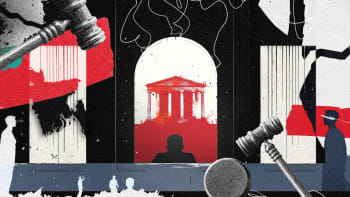Persistent rights concerns demand scrutiny

The joint appeal by six international human rights organisations to Chief Adviser Professor Muhammad Yunus—calling for an end to arbitrary arrests and detentions—deserves a proper response from the interim government. The letter urges immediate action to prevent such arrests and to review and withdraw cases deemed politically motivated or infringing on freedom of expression and other fundamental rights. It is worth recalling that the law adviser has, on multiple occasions, acknowledged that individuals have been falsely implicated in criminal cases, often as a result of political vendetta or personal disputes. He assured us that the government would review these cases and release innocent individuals. However, no significant progress has been made in this screening process, and a substantial number of people, including journalists, continue to languish in prison without due process.
We, therefore, fully endorse the rights groups' observation that the government should uphold press freedom and protect journalists from arbitrary arrests and detention, regardless of their perceived political affiliation. Of particular concern here is the continued detention of journalists on fabricated charges, including murder, amid scant progress in investigations conducted over the year. Charging individuals without credible evidence and repeatedly denying them bail on flimsy grounds undermine the core principle of justice that everyone has a right to be treated as innocent until proven guilty.
The joint letter also emphasises the need to strengthen state institutions to guarantee free and fair elections and to prevent democratic backsliding. It aptly calls for not restricting freedoms of association, assembly, and expression. These propositions are simple yet essential for holding any credible electoral process.
It should be mentioned that these leading rights groups have long supported the people in their struggle against autocracy and in pursuit of a just and democratic society. During the previous autocratic regime, these organisations stood in solidarity with them despite obstructions, including travel bans, surveillance of their partner organisations, and defamation. Some met Professor Yunus at home and abroad, expressed their support for his government's reform initiatives, and encouraged ensuring accountability for abuses committed by state and non-state actors both before and after the August 5 political changeover.
Their joint letter reiterates their support for the accountability process initiated by the interim government and calls on the military to respect the authority of the International Crimes Tribunal (ICT). It also urges security-sector reforms, including the disbanding of the Rapid Action Battalion (RAB), the exclusion of military personnel from civilian law enforcement, and the clear limitation of the DGFI's role to military intelligence with defined operational boundaries.
We hope the government will treat these constructive suggestions with the seriousness they warrant and critically assess its human rights performance over the past 14 months. It must also disclose the outcome of its review process and clarify how many innocent individuals, if any, have been released from wrongful detention.


 For all latest news, follow The Daily Star's Google News channel.
For all latest news, follow The Daily Star's Google News channel. 




Comments